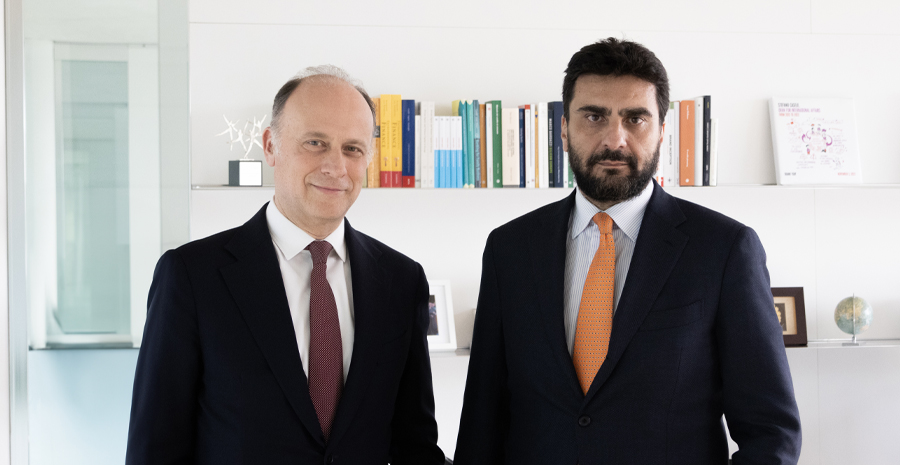
- Start date
- Duration
- Format
- Language
- 2 Dic 2025
- 4,5 days
- Class
- Italian
Real growth in the global economy over the last two years (2017 and 2018) was 3.7% a year, the advanced countries (led by the USA) managing 2.5% and the emerging countries around 5%, buoyed by the excellent (and continuing) performance of the south-east Asian economies, especially China and India. The International Monetary Fund expects a slow-down in 2019; but the question all observers are asking themselves is whether that slowing will take the unpleasant form of a world-wide crisis just as we had almost forgotten the last one.
The last year when things went wrong for the global economy was 2009, the year after the investment bank Lehman Brothers went bust. That time, the stagnation of world GDP was accompanied by severely negative figures for the United States (-2.5%) and the Eurozone (-4.5%). In a number of advanced countries, the Great Recession came in the wake of a crumbling property market: in the US, the Case-Shiller index of house prices fell by one third in the eighteen months from December 2006 to March 2008.
Next, from mid-2008 and in parallel with the fall in GDP, came the collapse of the equity market: The Dow Jones Industrial index was halved between September 2008 and March 2009. Similar developments were seen a little later in the United Kingdom and in Spain. In the UK house prices fell 19% over the course of 2008, while the London stock exchange lost 43% of its value in the same period and GDP shrank by 5.9% from Q3 2008 to Q3 2009. In Spain, where the property market registered a 10% fall from early 2008 to late 2009, the equity market collapsed by 50% and GDP fell also, though by less (-3.7% between mid-2008 and mid-2009).
Today by contrast, at the end of 2018, there is no sign of crisis in the property market, at least in those countries. In the USA, the Case-Shiller index rose above its pre-crisis peak in the course of 2018. In the UK property values had already returned to pre-crisis levels at end of 2015; what is more, UK property continued to rise even after the Brexit referendum of mid-2016. The Spanish property market, too, though still a long way from its pre-crisis levels, continues its steady advance. If, as Edward Leamer had it, the property market is the economic cycle, then at least three of the world’s big economies (the US, the UK and Spain) are showing no signs of recession.
The world is a big place, however, and clouds can appear on the horizon from elsewhere besides the property market. Investors are worried by at least two problems. One is that a recession could actually be caused by the central banks, the very institutions which saved the world after the Lehman bankruptcy.
The reason is simple: when Lehman failed, all the world’s central banks intervened to shore up the banks and support the bond and equity markets, buying massive amounts of public and private securities which consequently disappeared from the balance sheets of commercial banks; this freed up precious capital resources and improved net asset ratios accordingly. However, now that these economies are back on the path of growth these exceptional interventions have lost their main raison d’être and the holdings are therefore being unwound.
If the central banks withdraw too quickly from the bond markets (if, that is, they sell too many securities or merely fail to take them up) this could lead to a rapid constriction in the availability of credit, something usually associated with a decline in capital spending and in purchases of durable goods. The central banks’ turnaround in monetary policy has been particularly marked in the case of the US economy, where the Federal Reserve has for some time stopped buying securities and has already raised the reference rate used by the interbank market (the Federal Funds rate) nine times, by a total of 2.25 percentage points. The rise in US rates brings with it the likelihood that capital will drain away to there from the rest of the world: certainly, when rates rise in America the clock starts ticking on currency or financial crises in weaker markets. That has already happened in Turkey and Argentina, where local currencies and stock prices have fallen off a cliff while their governments and central banks are caught in a dilemma between raising interest rates to defend the currency and fears that such action could tip the economy into recession. But these are local problems, not problems of the global economy as a whole. Furthermore, if the US economy slows, its rates will rise less, or more slowly.
Then there is the risk of protectionism. Donald Trump’s presidency is establishing a new situation in the world, in which the great powers are no longer bound to interact according to the rules of the liberal economic order which have applied in recent decades. The customs duties threatened and already to some extent introduced by the US President are intended to correct distortions in the way the present global trade system works. That system does have many flaws; but Trump, like a bull in a china shop, is seeking to defend the workers and manufacturers left behind by globalization by disavowing trade treaties with Asia and Europe and by threatening tariffs – and imposing them, too, especially to counter government subsidies to Chinese steel producers and multinationals that exploit the NAFTA to offshore production to Mexico just over the US border.
The cure, though, is worse than the disease: for not all duties are the same, at least in principle. Some are surgical, in the sense that their specific object is to get the target government to change its behaviour. That government may retaliate rather than complying, however: then there’s a trade war in which everyone loses, the weakest most of all, as during the Great Depression. The economies of China, Germany and other exporters have begun to slow; but for now Trump has succeeded in renegotiating the NAFTA with Mexico and Canada (even changing its name to “USMCA”) without drowning the world in protectionism.
All in all, though the threats are many and serious, the global economy is fairly sound and the risk of a world recession in 2019 is unlikely.
Source: ISPI, Italian Institute for International Political Studies - by F. Daveri



This course aims to focus on essential leadership skills that are deemed vital in navigating the dynamic organizational landscape.

